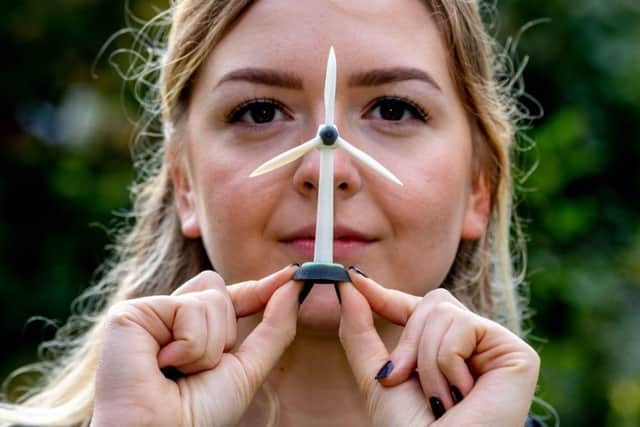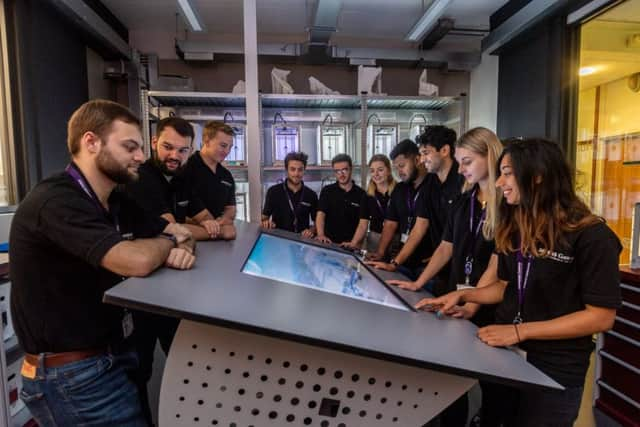How the University of Hull and Siemens are nurturing talent of the future


An apprenticeship scheme which aims to keep Britain at the forefront of the offshore wind industry has been launched in Yorkshire.
The Masters Degree course, the first of its kind in the UK, is being run by the University of Hull in partnership with Siemens. An initial intake of 10 students are gaining practical experience through placements as well as through academic study.
Advertisement
Hide AdAdvertisement
Hide AdThe area has long been dubbed the country’s ‘‘energy estuary’’, and Hull is recognised in the Government’s Industrial Strategy as an area of growth in the clean energy sector.


Professor Becky Huxley-Binns, Pro-Vice-Chancellor of Education at the University of Hull, said she wanted to help industry grow in the region.
She said: “We are delighted to be working with one of the world’s leaders in renewable energy to attract the brightest minds, who will be at the forefront of creating green energy for future generations and shaping the world we live in by facing the current environmental challenges head-on.
“We look forward to continuing to support industry by helping to deliver a strong talent pipeline of dedicated, diverse and skilled workers from engineers, technicians, scientists and more.”
Advertisement
Hide AdAdvertisement
Hide AdWork officially started this summer on the world’s largest offshore wind farm in Yorkshire; Hornsea One is due to be twice the size of the current record holder, Walney Extension. When fully operational next year, the wind farm will be able to power well over one million UK homes with clean electricity.


Earlier this year, the chairman of the National Infrastructure Commission (NIC) Sir John Armitt called green energy “a game changer” for the Humber economy, while Lord Prescott remarked that the region could become a world player in the field.
The Master’s Degree Apprenticeship in Offshore Wind Energy Engineering, through the University’s Department of Engineering, was launched in September. The programme leaders revealed there were 700 applicants to join the scheme.
Haamid Adam, one of the initial intake, said: “Directly working on cross-functional projects whilst studying for an MSc in offshore wind is exactly where I want to be: fighting climate change and creating a circular, sustainable energy economy. And this should be the same for any ambitious young graduate who has their eye on the future of wind energy and wants a successful career within it.”
Advertisement
Hide AdAdvertisement
Hide AdProfessor James Gilbert, programme leader for offshore wind at University of Hull, is convinced the scheme will help to boost the offshore wind industry around the Humber. He added: “The Humber is already the leading region for offshore wind in the UK but the Offshore Wind Sector Deal is projected to lead to huge growth in the sector with the Humber remaining a key contributor, particularly in operations and maintenance of offshore wind farms. The sector deal also identifies that employment in the sector will increase to around 27,000 and aims to increase the representation of women in the offshore wind workforce to at least a third by 2030.”
The apprenticeship programme is one way in which the University of Hull, Siemens Gamesa and Aura – the university’s collaboration with industry partners to harness innovation in the offshore wind sector – are working together to help achieve this ambition.
Professor Gilbert added: “We share the collective goal of ensuring that relevant training is in place to provide the skilled workforce required by the offshore wind industry. Working in partnership, we are already delivering courses and programmes to develop a skilled and diverse pipeline of strong talent to ensure the sector keeps developing at pace, delivers further economic growth and employment for the Humber region, as well as keeping Britain at the forefront of renewable energy.”
He continued: “Many of the jobs in offshore wind will require high-level qualifications but also sector-specific knowledge. The degree apprenticeship, which is the first of its kind in the UK, combines academic study with a valuable range of industry placements that will give these students the advanced knowledge to become leaders in the industry.”
But how important is this sector to the region’s economy?
Advertisement
Hide AdAdvertisement
Hide Ad“The sector has resulted in major investments in the region, including the £310m Green Port Hull facility – the Siemens Gamesa Blade factory and ABP port facility – and Ørsted’s recently opened East Coast Hub, which is the world’s largest operations and maintenance centre,’’ said Professor Gilbert.
“The world’s largest wind farm is also currently being built off the Yorkshire coast. Over 1,500 direct, high-value jobs have been created through Siemens Gamesa and Ørsted alone, with many more in the supply chains.”
The offshore wind industry has already contributed more than £116m to the local economy.
Professor Gilbert added: “It has also resulted in several companies setting up or moving to the region and growing rapidly. It has also been the launch-pad for companies to establish bases in other regions, such as the US and Taiwan, where offshore wind is beginning to take off.”
Advertisement
Hide AdAdvertisement
Hide AdProfessor Gilbert believes the graduates from this programme will be equipped with the skills they need to become leaders within the offshore wind sector. He hopes the growth of this scheme, along with other university initiatives through Aura, will help to cement the region’s international reputation as a centre for innovation in offshore wind.
He added: “The opportunity to develop graduates through an MSc while developing sector-specific knowledge is attractive to a lot of companies who want to support their employees to develop their careers. The fact that the programme is designed to meet the requirements for graduates to become Chartered Engineers makes it attractive to aspiring leaders.
“The University of Hull is in discussion with a number of companies about adapting the MSc/Apprenticeship model to suit the requirements of their specific sector.”
Aura is an initiative of the University of Hull, working with a group of key industry partners, academia and national, local and regional government as well as other key supporters. Its vision is to create a world-leading offshore wind research, talent and innovation hub.
Advertisement
Hide AdAdvertisement
Hide AdThe Aura Innovation Centre, currently being built at Bridgehead, Hessle, will support innovation for offshore wind energy and wider low-carbon sectors.
The centre aims to accelerate the development of new renewable and low carbon products and technologies.
It also aims to enhance the region’s reputation as the place to develop low-carbon and offshore wind innovation and bring together a cluster of knowledge and expertise in the low-carbon and offshore wind sectors.
Due to officially launch in early 2020, the Aura Innovation Centre will deliver ground-breaking low-carbon projects and kick-start new ideas by bringing together experts at the University of Hull with businesses in the Humber region and beyond. The £12m Aura Innovation Centre will provide a ‘‘front door’’ for the University of Hull, giving businesses easy access to cutting-edge facilities, specialist funded support and a space to collaborate with academic and industry experts – driving clean business growth.
Advertisement
Hide AdAdvertisement
Hide AdProgramme manager Sarah Clark said: “As the global economy shifts towards a low-carbon future, the green energy transition opens up a myriad of challenges and opportunities for businesses of all shapes and sizes.
“More than 180 dynamic, high-growth businesses have already engaged with the Aura Innovation Centre to find out how the University of Hull and Aura can help them accelerate their sustainable innovation projects.
“Four funded projects are currently live and are being delivered with colleagues across the University of Hull, with over 30 more in the pipeline before the centre has even opened.”